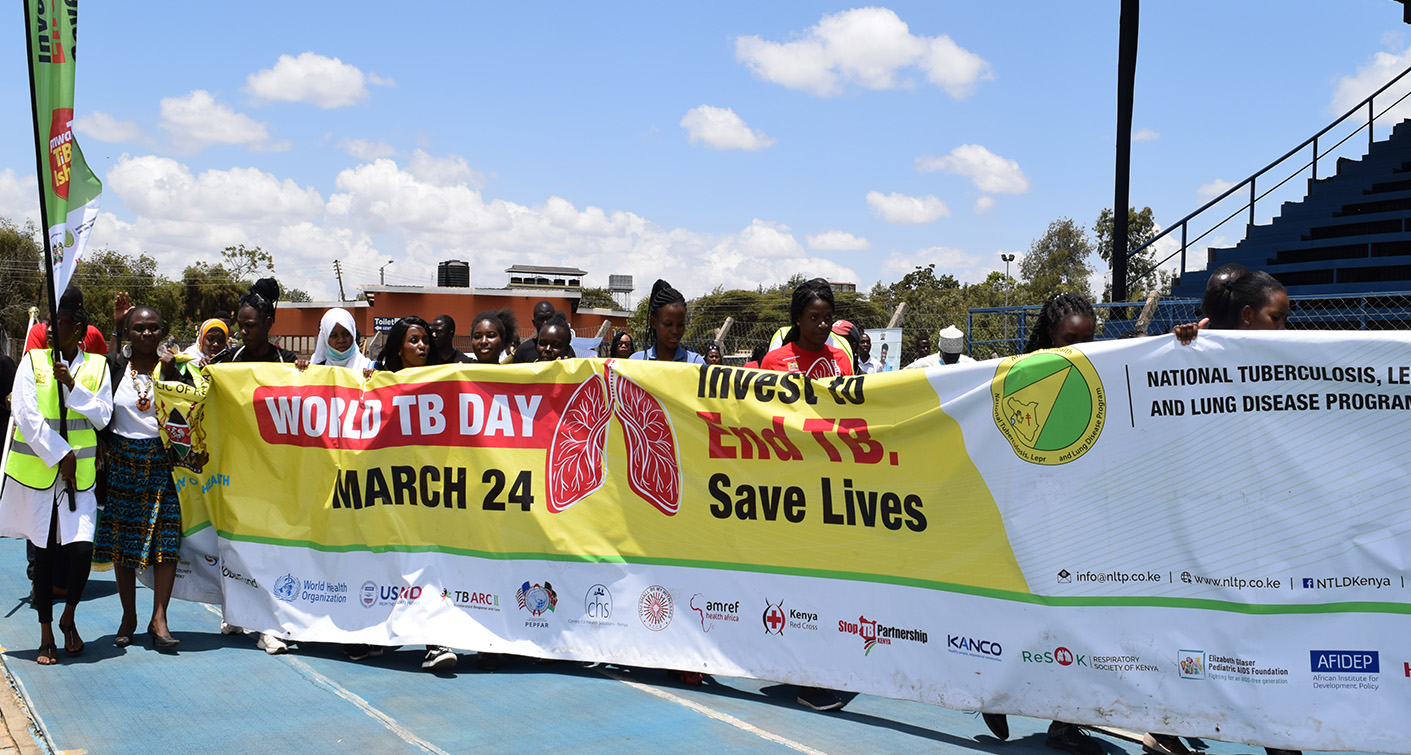Blogs

As one of the leading infectious diseases and causes of death, Tuberculosis (TB) remains a serious public health concern worldwide. Each year on March 24, stakeholders including the health community, relevant government agencies and the general public, observe World Tuberculosis Day to raise people’s awareness and ignite commitment and efforts toward eliminating TB.
In 2020, an estimated 10 million people fell ill with TB, 56% men, 33% women and 11% children. 4.1 million people were not detected and 1.5 million people died from TB. The latest figures indicate that approximately 33,000 Kenyans have died from TB since 2020. An alarming two people die every hour despite effective treatments being available.
The COVID-19 pandemic has significantly disrupted services including TB care and management leading to an increase in deaths in the country. This year’s theme, ‘Invest to End Tuberculosis. Save Lives, is therefore an urgent call to attention on the need to invest necessary resources to step up the fight against TB and realize global leaders’ commitments to end TB.
In commemorating the 2022 World TB Day, AFIDEP joined actors and partners in Kenya at a national event held in Machakos County. The event was organized by the National Tuberculosis, Leprosy, and Lung Disease Program (NTLD) of the Kenya, Ministry of Health and graced by the Machakos County Governor, Dr. Alfred Mutua, representatives from local and international NGOs as well as the local community. At the commemoration, county governments were called on to focus on strengthening TB testing and treatment. Dr. Mutua noted that having the right political leadership that would fight for policies that ensure prioritisation and investment in universal health care is critical. “Politicians should invest in ensuring great control of budget within designated health services for development. The incoming government will have to push for more allocation in investments from the current 7%,” he said. According to the World Health Organization (WHO), funding for TB prevention, diagnosis and treatment services continues to fall short of estimated global needs, and the United Nations’ global target.
In 2020, global spending on TB services fell to US$5.3 billion, and funding for research was US$901 million. While national strategic plans and accompanying budgets for tuberculosis have grown in ambition, mobilisation of funding has not kept pace. In Africa, governments contribute only 22% of the resources required to deliver adequate TB services, with 44% going unfunded, seriously impeding efforts to reduce the TB burden.
Speaking at the event, John Keuhnle, a US Government representative highlighted that, “TB is one of the leading causes of morbidity and mortality in Kenya, yet it is treatable and curable. ”He further stated that, “we can overcome TB and reduce statics of deaths if all partners work together to come up with interventions to reduce TB infections.”
A recurring theme during World TB Day is the need to have an all-inclusive and comprehensive approach to diagnosing, treating and managing treatment, with men identified as the weak link to effectively achieving this. As we invest to end TB, there is need for interventions aimed at increasing men’s access to TB treatment, care and support. Males have had the highest risk of death from TB and also when men have undiagnosed and untreated TB, they risk transmitting it to their families and community at large.
Through the Leaving no-one behInd: Transforming Gendered pathways to Health for TB (LIGHT) Initiative, AFIDEP is working with partners in Africa and the UK to generate new evidence on the effectiveness of different gender-sensitive pathways and approaches to health for those with TB, especially in urban, HIV-prevalent settings.
Within this scope, in 2021, AFIDEP conducted a policy analysis in Kenya that revealed a gendered TB policy gap in diagnosis, treatment and management of TB. Lack of gendered TB policies run the risk of continued high transmissions to populations of all gender and ages hindering the realization of national and global targets to end TB. A key recommendation from the analysis is to spotlight more on the high burden of TB among men and invest in male-friendly diagnostic and screening services, with the aim of reducing undiagnosed TB among men and ultimately the entire community.
About LIGHT
LIGHT is a six-year cross-disciplinary global health research programme funded by UK aid, led by LSTM working with partners in Kenya, Malawi, Nigeria, Uganda and the UK. LIGHT aims to provide new evidence on the effectiveness of different gender-sensitive pathways and approaches to health for those with TB in urban, HIV-prevalent settings. The initiative will contribute to improved health, socio-economic and equity outcomes and efforts to stop the spread of TB.

